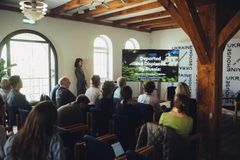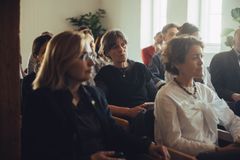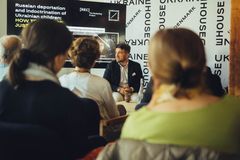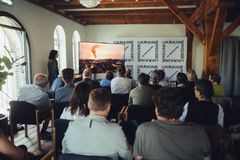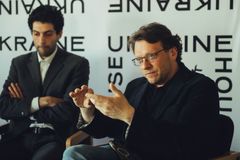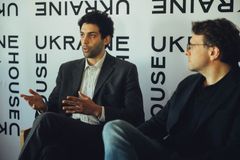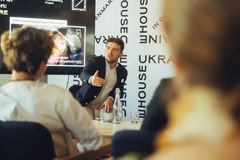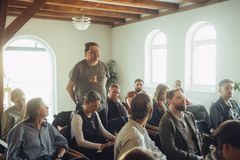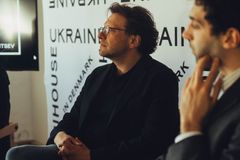Ukraine’s Stolen Future: Exposing Russia’s War on Ukrainian Children
29.5.2025 08:00:00 CEST | Ukraine House in Denmark | Press release
On April 30, Ukraine House in Denmark hosted a powerful evening of testimony, legal clarity, and urgent moral reckoning—highlighting one of the most horrifying aspects of Russia’s war against Ukraine: the systematic deportation and indoctrination of Ukrainian children.
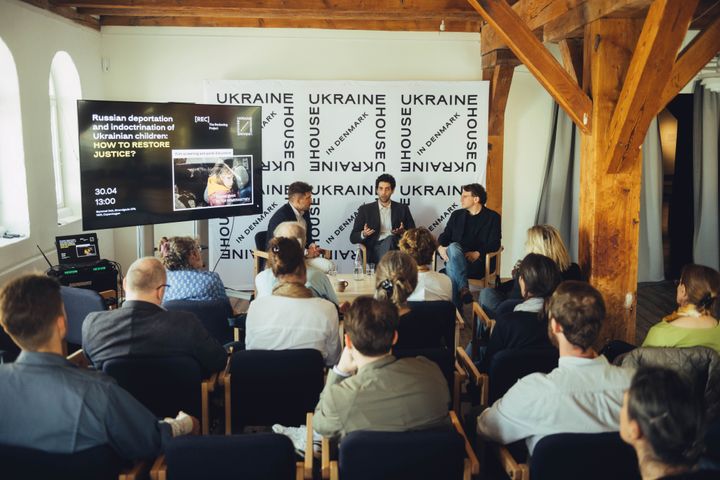
The evening began with a screening of The Reckoning Project’s investigative documentary on the Oleshky Children’s Boarding School—once a place of care for orphans and children with disabilities, now a tragic emblem of Russia’s forced displacement campaign. The documentary was followed by a discussion featuring Executive Editor Peter Pomerantsev, Legal Analyst Kareem Asfari, and Ukraine Country Director Maksimas Milta.
Together, they exposed how this pattern of abductions is not the byproduct of war, but a deliberate state policy—aimed at destroying a nation by rewriting the identities of its youngest citizens.
The emotional heart of the documentary was the story of Gosha, a child taken from Oleshky and transferred deep into occupied territory. Maksimas Milta reminded the audience:
“This documentary film is not about this individual, particular story alone—it’s about the fates of hundreds and thousands of kids who have not been able to be returned. From the whole figure—19 and a half thousand children who were deported—only 1,300 have been returned to Ukraine. If we do the math and think about one child being returned every single day, it would take almost a century to return them all. And that is the scope and the scale of atrocities that have been committed against children.”
Peter Pomerantsev emphasized the ideological and structural dimension of these actions:
“It really confirms this idea of Russia as a terrorist state. This is what terrorists do. They’re stealing and abducting children and holding them hostage.”
He elaborated that this strategy is not just about removing children from their families—it is about annihilating the very idea of Ukraine:
“It’s not just the erasure of culture. It’s not just the repression of language. It’s not just mass deportation. It’s not just removing children from their homes. It’s an attempt to recreate a country that doesn’t exist anymore—to overwrite identity in the most vulnerable and permanent way possible.”
Kareem Asfari clarified the legal framework, stating that the mass abduction and forced integration of children into Russian families constitutes a grave breach of international law:
“There is an absolute prohibition on the unlawful deportation or forcible transfer of individuals during wartime. Under the Geneva Convention, children enjoy special protection, and the Convention on the Rights of the Child affirms the right to identity, which includes name, nationality, and family relations. What is being done to Ukrainian children breaches every one of these protections.”
The conversation also addressed what is happening within occupied schools. In one example documented by The Reckoning Project, 64 out of 70 teachers were fired for refusing to cooperate with the occupation administration. Those who remained were forced to conduct compulsory lessons in Russian language and ideology. These are not isolated cases—they are part of what the panel described as “a totalitarian remaking of an entire country.”
Pomerantsev went further:
“What Russia is doing is a form of weaponized family-making. They’re creating what I’ve called ‘an abusive and genocidal family,’ built not on love or nurture, but on control and terror—crafted at the barrel of a gun.”
And yet, the world remains largely silent. Pomerantsev offered a searing critique of democratic complacency:
“To support democracy and still believe in justice [and] democratic order—we really have to change our mentality. I think we’ve had a very wrong idea about how you achieve democratic ends. We got very lazy. We’ve had too many decades of success, and we thought that justice would just happen: the media would publish stories, a lawyer somewhere would take it to trial.
But on the other side—the authoritarians, the extremists— they’ve learned to combine criminal networks, disinformation, and state power in a very effects-driven way. They identify an aim—like bringing far-right parties to power in Europe—and use all the tools at their disposal to achieve that.
We have to start thinking: what is the democratic version of this? In this space, it’s thinking about what are the dependencies that Russia has, particularly in places where international law still matters.”
He concluded with a challenge:
“What hasn’t happened is a global campaign for Ukraine’s children that would be recognizable and instantly emotive. That is what’s missing. The absence of this campaign is not just a gap in awareness—it is a moral failure.”
Nataliia Popovych, chairperson of Ukraine House in Denmark expressed deep gratitude to The Reckoning Project and the panelists for their courageous, tireless work. She said:
“The international community must respond with the seriousness these crimes demand: by upholding every Ukrainian child’s right to identity, safety, and return home—and by ensuring that those responsible are brought to justice.”
Images
About Ukraine House
The Ukraine House in Denmark is a civil society organisation of Ukrainian cultural diplomacy based in Copenhagen. Its mission is to form an enduring positive influence of Ukraine on Ukrainian-Danish cooperation, security, and lasting peace in Europe.
Subscribe to releases from Ukraine House in Denmark
Subscribe to all the latest releases from Ukraine House in Denmark by registering your e-mail address below. You can unsubscribe at any time.
Latest releases from Ukraine House in Denmark
Post-Release: Tymofii Brik on the Evolution of Ukrainian Society through Data on Social Change and Cohesion4.3.2026 12:21:51 CET | Pressemeddelelse
On January 22, Unity of Ukraine Day, Ukraine House in Denmark hosted a public discussion examining how Ukrainian society has transformed over the past three decades and what makes it resilient today amid full-scale war. Drawing on extensive sociological research, the event explored questions of trust, identity, decentralization, civil society, and polarization, offering a data-driven perspective that goes beyond simplified narratives. The discussion was moderated by Nataliia Popovych, who opened the event by framing Ukraine’s current resilience as the outcome of long-term social change rather than a sudden wartime phenomenon. The keynote presentation was delivered by Tymofii Brik, sociologist and rector of the Kyiv School of Economics, who presented findings from multiple national and international studies conducted before and during the war.
Europe’s Security Through Ukraine: Briefing & Policy Roundtable with the Da Vinci Wolves Battalion4.3.2026 12:14:14 CET | Pressemeddelelse
On February 3, Ukraine House in Denmark hosted a discussion on Europe’s security through the lens of Ukraine’s wartime experience. The event brought together Ukrainian defenders of the Separate Assault Battalion “Da Vinci Wolves” of the Armed Forces of Ukraine — one of the most adaptive frontline units of the full-scale war, and representatives of Ukraine’s defence-focused civil society.
Oleksandra Matviichuk's speech at "Ukrainske Stemmer — historier om frihed" solidarity evening at Det Ny Teater3.3.2026 16:30:01 CET | Aktuelt
Read the speech by Oleksandra Matviichuk delivered during the solidarity evening at Det Ny Teater on February 22, 2026.
Ukraine House in Denmark Opens “Voices of Dignity: Literature of Resistance” Exhibition – A Century of Ukrainian Cultural Defiance20.2.2026 10:49:04 CET | Presseinvitation
On February 23, 2026, Ukraine House in Denmark opens its new exhibition “Voices of Dignity: Literature of Resistance” — an exploration of how Ukrainian literature has functioned not only as art, but as an act of resistance across the twentieth and twenty-first centuries. It is a tribute to the Ukrainian literary voices who were persecuted or silenced under imperial and totalitarian regimes, those who were killed as a result of Russia’s full-scale invasion, and those who continue to write under the conditions of war.
Nobelprismodtager, danske stjerner og ukrainske forfattere markerer fireåret for krigen i Ukraine med storstilet solidaritetsaften på Det Ny Teater13.2.2026 12:43:20 CET | Presseinvitation
Den 22. februar 2026 inviterer Ukraine House in Denmark, Dansk Kulturinstitut og Det Ny Teater til ”Ukrainske Stemmer – historier om frihed”, en solidaritetsaften for Ukraine på tærsklen til fireåret for Ruslands fuldskalainvasion. På scenen kan bl.a. opleves den ukrainske nobelprismodtager Oleksandra Matviichuk, den danske verdensstjerne Nikolaj Coster-Waldau, Bodil Jørgensen, Ellen Hillingsø, Christine Albeck Børge, et 26 personers stort kammerorkester, samt en række ukrainske kunstnere.
In our pressroom you can read all our latest releases, find our press contacts, images, documents and other relevant information about us.
Visit our pressroom
